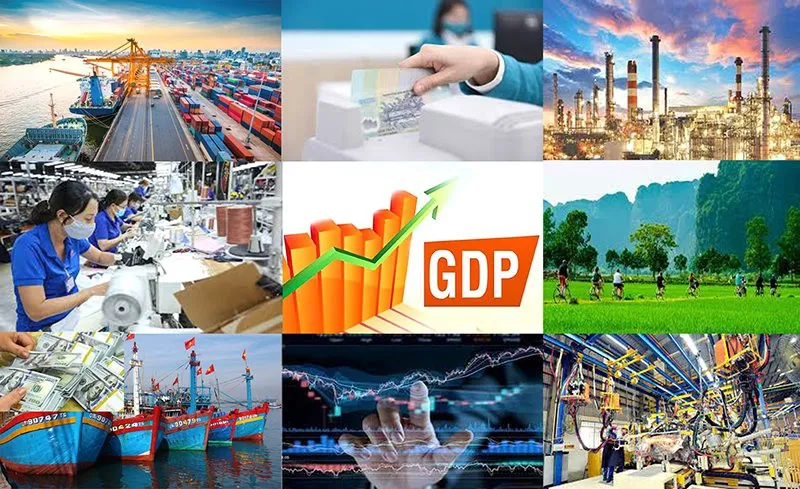
JOURNALIST: - In your opinion, what will Vietnam's economic growth be like in 2024, sir?
DR. NGUYỄN HỮU THỌ: - Vietnam's economic growth increasingly depends on the international context, given the rising level of international integration and openness of the Vietnamese economy. It is anticipated that in 2024, the international environment will become more complicated and challenging. The global economic recovery is expected to be modest, and inflation is likely to remain high. Of particular concern is the ongoing military conflict between Russia and Ukraine, the re-emergence of the Hamas-Israel conflict, and heightened tensions in the Red Sea.
This geopolitical instability disrupts supply chains, leading to an increase in the cost of transporting goods both into and out of Vietnam. This situation poses challenges for domestic production. Vietnam's economic growth heavily relies on exports, making it susceptible to the economic developments of its trading partners. Among Vietnam's top five trading partners – the US, China, and Japan – the International Monetary Fund (IMF) forecasts a decrease in growth, presenting a challenging scenario for the Vietnamese economy.
- Sir, what is your perspective on the gradual decrease in Vietnam's economic growth over the past 2-3 years?
- Over the past 2-3 years, Vietnam's economic growth has experienced a gradual decline. According to data from the General Statistics Office covering the period from 2005 to 2023 (nearly 20 years), Vietnam's economic growth has generally been at a high level, ranging from 6% to 8%. However, there have been seven years where economic growth fell within the 5-6% range, including years affected by the global financial crisis, the COVID-19 pandemic, and post-COVID-19 challenges, along with armed conflicts in 2023. The lower growth rates during these periods are largely attributed to global factors, as the world economy faced periods of slow growth.
Even though Vietnam's economic growth has decreased, it is essential to note that when compared to the global context, the country still performs relatively well. In 2023, according to calculations by the International Monetary Fund (IMF), Vietnam's growth reached 4.7% (according to Vietnam's calculation, it was 5.05%), whereas the world economic growth was only 3.0%, and the ASEAN region averaged 4.2%. Given the state's effective economic management and the development trend in 2023, achieving a 6% growth rate in 2024 is plausible and aligns with the National Assembly's target of 6-6.5%.
- In your opinion, what is the basis and motivation for forecasting 6% growth in 2024?
- The basis and motivation for forecasting a 6% growth in 2024 can be attributed to several key factors. Firstly, there is a proactive approach by the State and economic organizations, anticipating the prevailing global context and formulating improved policies. This strategic foresight enables better preparedness for potential challenges.
Secondly, the overall economic landscape has shown positive trends, contributing to the momentum for growth in 2024. While the industry-construction sector experienced a slow recovery in 2023, agriculture and services sectors exhibited robust growth. Despite persistent challenges, the enterprise sector has displayed signs of development.
Thirdly, the State's consistent economic recovery and development policies, along with continued emphasis on public investment, are expected to be sustained in 2024. National plans and local socio-economic plans have been thoroughly completed, providing a solid foundation for effective implementation and creating new avenues for growth.
Additionally, foreign direct investment (FDI) flows are showing a notable shift towards Asian countries, with Vietnam being a prominent destination. The realized FDI capital in 2023 is estimated to reach USD 23.18 billion, marking a 3.5% increase compared to the previous year. This represents the highest amount of realized capital in the past five years, signaling a positive trend for economic development in the upcoming year.
- Sir, what solutions do you propose to promote economic growth in 2024?
- To foster economic growth in 2024 and achieve the National Assembly's set goals, a comprehensive and concerted effort is crucial. I believe there are three main groups of solutions.
Firstly, it is imperative to continue stabilizing the macroeconomy and controlling inflation. Managing inflation is anticipated to be particularly challenging, given the global expectation of sustained high inflation in 2024. Domestic factors, especially the implementation of the wage reform plan scheduled for July 2024, may also impact inflation.
Secondly, there should be a persistent focus on enhancing institutions and the business environment. Key areas of emphasis include completing legal regulations and supportive policies to address challenges in specific input factor markets, such as corporate bonds and real estate. Additionally, removing obstacles for the effective implementation of national target programs and economic recovery and development initiatives is crucial. Completing documents for the immediate execution of approved socio-economic development plans is vital. Lastly, a steadfast and effective implementation of the solutions outlined in Resolution 02/NQ-CP for 2024, aimed at improving the business environment and enhancing national competitiveness, is essential.
Thirdly, continuous investment in production infrastructure is paramount. This support not only boosts the productivity of individual enterprises and regions but also fosters production in the direction of regional integration, forming highly specialized production areas. The primary focus should be on infrastructure areas such as transportation, electricity, and technology, with major drivers being Hanoi and Ho Chi Minh City, utilizing transportation infrastructure as a key breakthrough.
- Thank you very much.




















